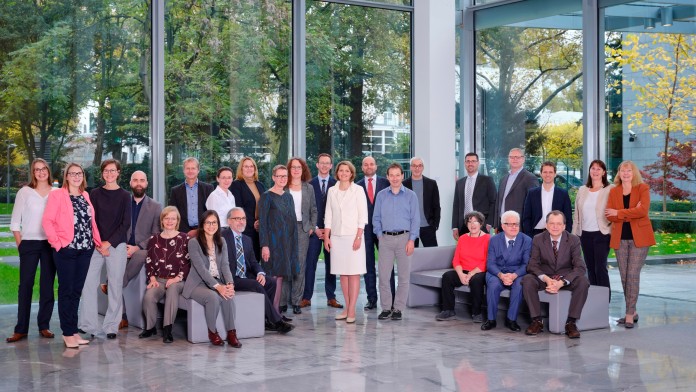Tip: Activate javascript to be able to use all functions of our website
Press Release from 2017-11-30 / Group, KfW Research
KfW Research sends growth forecast for Germany sharply higher, raising it to 2.3% in 2017 and 2.5% in 2018
- Exports are growing and domestic demand is steadily trending upwards
- Capacity utilisation is rising but no immediate risk of overheating
- Businesses are optimistic about their prospects in the New Year and investing more
- Difficulty in forming government is not affecting upturn
The German economy moved up a gear in summer and all signs are pointing to strong economic performance in autumn and at the start of winter. The outlook for the coming year is also very good. KfW Research has therefore raised its growth forecast for Germany to 2.3% for this year (previous forecast 2.0%). Economic output should grow by as much as 2.5% in 2018 (previous forecast: +2.0%).
Part of the significantly higher gross domestic product (GDP) growth rates for 2017 is due to the new official statistical data and therefore purely technical (especially the German Federal Statistical Office’s upward revision of first-quarter GDP growth to now +0.9% on the previous quarter). But the updated growth forecasts also reflect a noticeable increase in ‘genuine’ optimism because the upswing is broadening further.
Germany’s exports are growing on the back of the consolidating recovery in Europe and around the world. At the same time, domestic demand remains on a steady upward trend. Given the persistently strong employment growth and rising wages, consumption should pick up pace again after taking a breather in the third quarter of 2017 and gain further momentum during the forecast period. The prospects for private residential construction are also good, as building permits awaiting implementation now outnumber completed housing units by around 600,000. All in all, domestic and international demand is gradually driving capacity utilisation levels higher and higher. As a result, businesses are extremely confident and investing more.
“The signs continue to justify optimism about the business cycle. The German economy is not merely staying the course of growth it embarked on since 2010, it is even accelerating the pace”, said Dr Jörg Zeuner, Chief Economist of KfW. He added that real growth in 2018 will exceed the long-term average of around one and a half per cent for the fifth consecutive year. “But I still do not see any risk of overheating any time soon. Continuing employment growth and the absence of wage pressure mean the economy is not at risk of overheating from production capacity over-utilisation”, said Zeuner.
Furthermore, production capacity is likely to be expanded further next year. Businesses have already begun to invest more and a renewed increase can be expected for 2018. It is true that labour shortages are becoming apparent in some occupational groups. But migration from other EU states into the German labour market is counteracting the occurrence of severe shortages across the economy as a whole and, combined with rising labour participation of older and female workers, is ensuring that the factor labour can also continue to grow in Germany.
The main risks for Germany’s business cycle in the year ahead lie in the international sphere. The Brexit negotiations and the unclear direction of US policy remain key elements of uncertainty. The upswing in the US is now relatively advanced and therefore vulnerable to any misguided economic-policy decisions that may be taken there. Europe and Germany would probably not be able to fully shield themselves from dampening effects on the business cycle coming from the US. The challenging work of forming a new government after the failure of the Jamaica talks is hardly likely to affect the cyclical upturn in Germany in the short term. In the longer term, however, the risks are higher because Germany must tackle major structural challenges and the legitimate expectations of further developing the European Union are rising.
The current KfW Business Cycle Compass is available at:
www.kfw.de/konjunkturkompass


